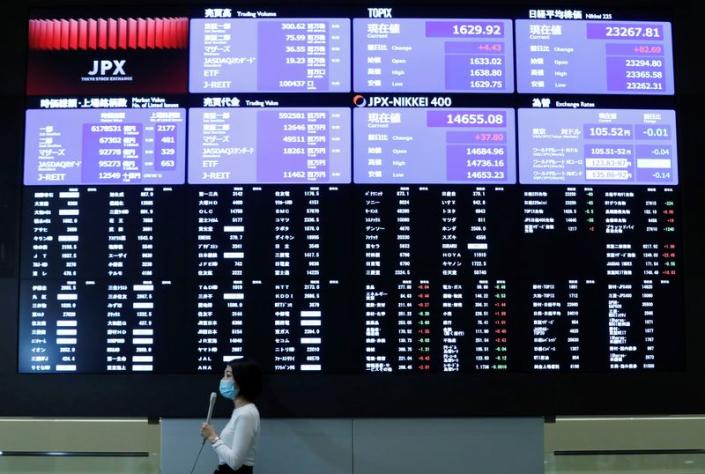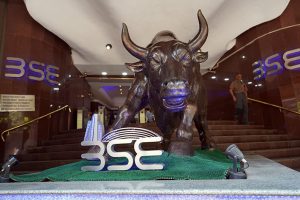Asian stocks were lifted by an AI-inspired surge on Monday as a tech-led boom helped lift indexes to multi-year highs at the start of the week.
In a week brimming with central bank meetings, major data releases and corporate earnings posts, investors were, for the most part, in positive mood betting on some good news coming their way.
In contrast, China and Hong Kong markets were in freefall again with the territory’s benchmark falling to a 14-month low while mainland stocks struggled, despite signs of support from state-backed funds, as foreign outflows continued over concerns about the region’s deepening economic woes.
Japan’s Nikkei share average rallied to a fresh 34-year peak as the US S&P 500’s record-high close on Friday buoyed investor sentiment, despite continued signs of overheating in the Asian market.
Also on AF: Red Sea Attacks Spur a Surge in Asia-to-Europe Air Freight
After opening sharply higher, the Nikkei fell back a bit in the morning session before rising as much as 1.69% to 36,571.80, a level not seen since February 1990, in late trade. It closed the day 1.62% higher at 36,546.95, while the broader Topix was ahead 1.39%, or 34.89 points, to 2,544.92.
The Nikkei’s 9.2% advance so far this year has put it head and shoulders above developed market rivals, many of which are in negative territory.
Japanese shares have had an additional tailwind this year from receding bets for an imminent end of Bank of Japan stimulus, particularly after the devastating New Year’s Day quake on the country’s west coast. The Bank of Japan (BOJ) announces its policy on Tuesday.
Hong Kong’s Hang Seng Index tumbled to the lowest level since November 2022, led by property and tech shares. The benchmark dropped 2.27%, or 347.51 points, to 14,961.18.
China’s bluechip CSI300 Index fell 1.56%, beyond a five-year low, while the Shanghai Composite Index slipped 2.68%, or 75.94 points, to 2,756.34. The Shenzhen Composite Index on China’s second exchange plunged 4.47%, or 75.31 points, to 1,611.26.
Data last week showed China’s economy grew slightly more than the government’s official target but the recovery was far shakier than many analysts and investors had expected.
Market sentiment was also dampened by Donald Trump’s victory in the Iowa Republican caucus, given the former US president’s tough stance on China.
Elsewhere across the region, in earlier trade, Sydney, Singapore, Taipei, Manila and Wellington also rose but Seoul dropped. MSCI’s broadest index of Asia-Pacific shares outside Japan still eased 0.45%, having already taken a drubbing last week, dragged down by China’s woes.
Nasdaq futures extended their rally with gains of 0.6%, while S&P 500 futures firmed 0.2%. Eurostoxx 50 futures jumped 0.8% and FTSE futures 0.3%.
ECB Set to Hold Rates
The European Central Bank (ECB) meets on Thursday and is considered certain to hold steady, given recent hawkish commentary from top officials.
Hawkish talk has also seen markets scale back the probability of a March cut from the Federal Reserve to 49%, from around 75% a couple of weeks ago.
Yet, a first easing of 25 basis points in May is more than fully priced. Fed officials are in blackout this week ahead of the next meeting on January 30-31. Prospects for an early easing could be affected by data on US economic growth and core inflation due later this week.
Gross domestic product is seen running at an annualised 2% pace in the fourth quarter, while the core personal consumption price index is seen slowing to an annual 3.0% in December, down from 3.2% the previous month and the lowest since early 2021.
Recent data has tended to surprise on the high side, one reason yields on 10-year Treasuries climbed almost 20 basis points last week to last stand at 4.12%.
That shift underpinned the dollar, which hit a five-week high on a basket of currencies. It was a shade lower at 148.07 yen on Monday, having jumped 2.2% last week, while the euro was idling at $1.0900 after easing 0.5% for the week.
In the oil market, worries about global demand has so far offset the threat to supply from tensions in the Middle East. Brent was off 23 cents at $78.33 a barrel, while US crude for January eased 25 cents to $73.16 per barrel.
Key figures
Tokyo – Nikkei 225 > UP 1.62% at 36,546.95 (close)
Hong Kong – Hang Seng Index < DOWN 2.27% at 14,961.18 (close)
Shanghai – Composite < DOWN 2.68% at 2,756.34 (close)
London – FTSE 100 > UP 0.18% at 7,475.52 (0934 GMT)
New York – Dow > UP 1.05% at 37,863.80 (Friday close)
- Reuters with additional editing by Sean O’Meara
Read more:
China Banks Moves to Stabilize Yuan as Stock Markets Slide
China Firms Using Own Cash to Launch ‘Sponsored’ Equity Funds
Debt-Laden Chinese Regions Told to Stop Some State Projects
Nikkei Lifted by Global Tech, Hang Seng Dips on China Worries























